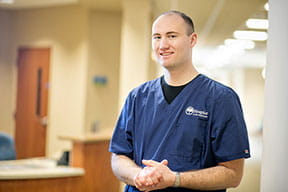James McDaniel shares why he focuses on end-of-life care and how his education is shaping him as a leader.

James McDaniel
Photo credit: Jamie Turner
As a staff nurse, it was go, go, go. James McDaniel ’11 never felt he had the time to do more than check in with patients, dispense medication, and be off to the next room (or his next shift at another location) when he worked at hospitals in West Virginia. That’s one of the many reasons he accepted a position as a team nurse in 2009 at Hospice of the Panhandle, where he’s able to spend time with patients and ensure each has a peaceful end-of-life experience.
His dedication to patients and fellow staff was quickly recognized. McDaniel was promoted to interim nursing home team leader in 2010, South Berkeley team leader in 2011, assistant clinical director in 2012, and interim clinical director in 2013 before accepting his current role as inpatient facility director in August 2013.
As inpatient facility director, McDaniel shaped the culture of the hospice’s newly built facility by hiring the right individuals before it opened in March. Since then, his focus has shifted to ensuring a high level of care for patients and their families. “I’m in charge of everything from managing nursing and housekeeping staff to writing policies and procedures that impact how patients are cared for,” he explains.
Despite what sounds like an extraordinarily busy schedule, McDaniel explains why he finds it manageable to pursue a degree, including his Doctor of Nursing Practice (DNP), his second degree from Walden. It’s also impressive to learn that he’s the first in his immediate family to earn a bachelor’s degree. “It’s always been ingrained in me that I would go to college,” he says. When he earned his bachelor’s, a professor encouraged him to stay dedicated to continuous learning, which is why he immediately pursued his MSN.
His education also clearly underscores why he’s excelled in his career so quickly (he’s just 30 years old). While earning his MSN, he learned how to analyze budget and staffing needs for a hospital, which has informed his work at the hospice. “It helped me design and budget for a new kitchen in the new inpatient facility,” he says. He’s also learned how to staff and run the facility and order medications, food, and linens accurately and efficiently.
His DNP coursework has taught him evidence-based practice methods and how to be a leader. Part of his task as director, he says, is to shape the culture of the hospice. “My approach to patients is, ‘What can I do for you today?’ I have the time. I want our nurses to act the same way, as if patients are part of their extended families.”
A small gesture like sitting with a patient, holding her hand, and watching her favorite TV show may be all it takes. “Hospice focuses on individualized care and a person’s last wishes,” says McDaniel. “We want families to feel confident in the care of their loved ones.”
McDaniel is also committed to his community. “I’ve learned so much from the programs at Walden that I’ve tried to give back,” he says. He serves on two advisory boards, one for a local technical institute and another for a community college. “I see myself as a change agent. I know about end-of-life issues and want to help shape their programs.”
As far as McDaniel sees it, the only way is up. After he completes the DNP program, he may have his sights set on yet another goal. “If I want to become CEO of this organization,” he says, “I might have to earn an M.B.A.”
Tell us why you’ve returned to Walden for another degree at [email protected].



